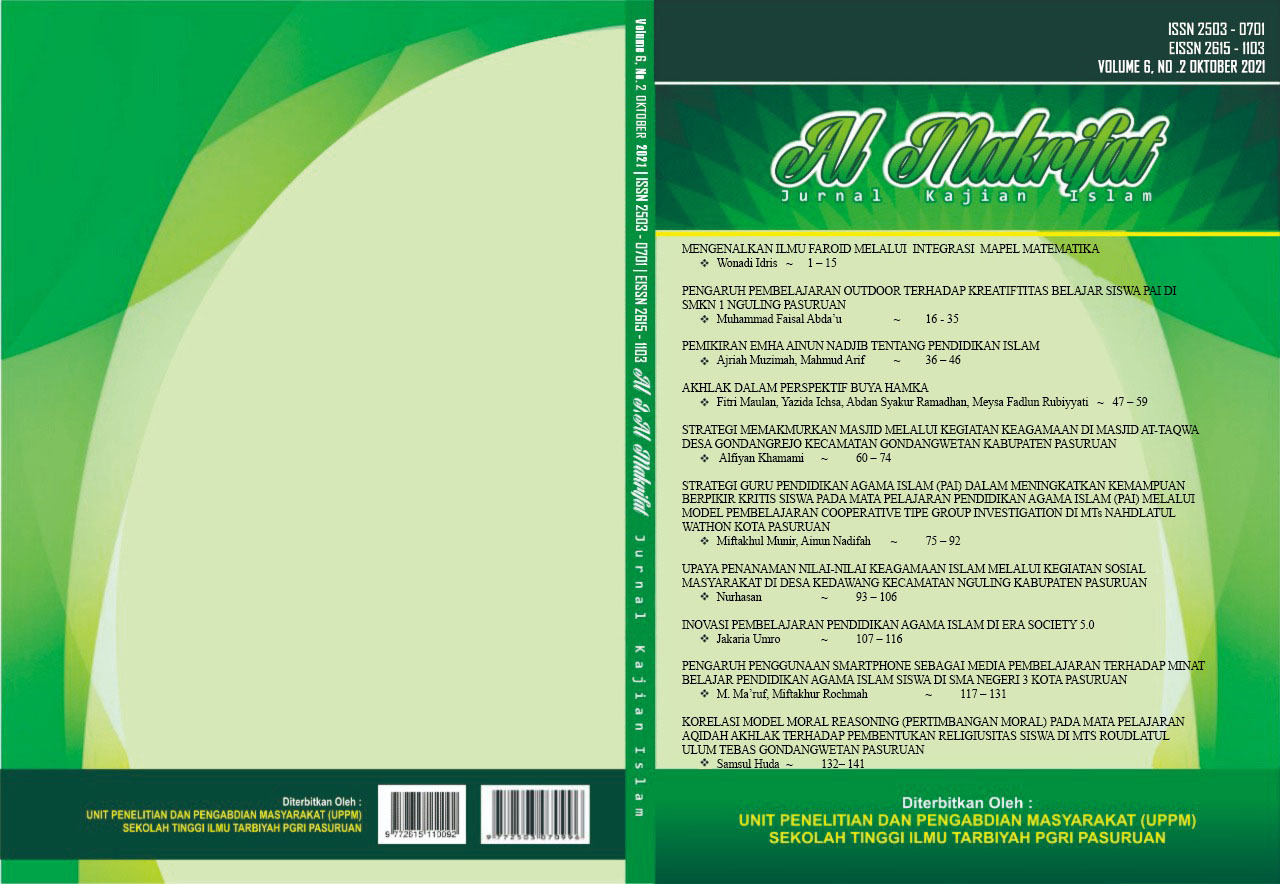Akhlak Dalam Perspektif Buya Hamka
Abstract
The moral crisis that hit society in our country is the impact of a free life and the lack of application of moral education both within the family, environment and educational institutions. Resulting in a lot of deviations. This article aims to find out Morals in Buya Hamka's perspective, and the actualization of Buya Hamka's thoughts on morality. The writing in this article uses a literature study study method with data collection techniques in identifying discourses that have relevance to the problems discussed, whether they come from books, papers, articles, journals, web (internet), or other information related to the study. on Morals in Buya Hamka's Perspective. The results of the research that in Buya Hamka's perspective, morality is defined as character which is the main goal for humans who want to perfect their human nature. Morals are the goal in a human's life to become a real human being. Therefore, it can be interpreted that morals in Buya Hamka's view are human goals in achieving self-perfection as individuals and because humans are social beings who live in society, the perfection of human morals will have a good impact on social life. Buya Hamka views that morality can be formed. Moral actualization can be done through education, both informal education and formal education, through habituation and example. Keywords: Morals, Buya Hamka, ActualizationReferences
Adnan, M. (2018). Pola Asuh Orang Tua Dalam Pembentukan Akhlak Anak Dalam Pendidikan Islam. CENDEKIA : Jurnal Studi Keislaman, 4(1), 67–81. https://doi.org/10.37348/cendekia.v4i1.57
Anjani, S. (2018). NILAI-NILAI PENDIDIKAN AKHLAK MENURUT BUYA HAMKA DALAM BUKU FALSAFAH HIDUP. repository.uinsu.ac.id, 43.
Jannah, N. M. (2016). STUDI KOMPARASI PEMIKIRAN KH. HASYIM ASY'ARI DAN HAMKA TENTANG PENDIDIKAN KARAKTER. repository.uinjkt.ac.id, 5.
Kurniawan, M. A. (2018). PANDANGAN HAMKA TERHADAP URGENSI PENDIDIKAN ISLAM DALAM KEHIDUPAN MANUSIA. Skripsi.
Marlianti, A. Y. (2021). ANALISIS KARAKTER GENERASI MILENIAL DARI SUDUT PANDANG BUYA HAMKA. Jurnal Fakultas Ilmu Keislaman, 1.
Miswar, d. (2017). Akhlak Tasawuf Membangun Karakter Islami. Medan: Perdana Publishing.
Moh. Rivaldi Abdul, T. R. (2020). Pembentukan Akhlak Dalam Memanusiakan Manusia: Perspektif Buya Hamka. PEKERTI: Jurnal Pendidikan Islam & Budi Pekerti, 80.
Musli. (2011). Metode Pendidikan Akhlak Bagi Anak. Media Akademika, 26.
Nufus, H. (2017). KONSEP PENDIDIKAN ANAK DALAM PENGEMBANGAN AKHLAK PERSPEKTIF HAMKA. repository.uinjkt.ac.id, 31.
Rahim, A. (2013). KONSEP AKHLAK MENURUT HAMKA (1908-1981). repository.uin-suska.ac.id, 1.
Rahim, A. (2013). KONSEP AKHLAK MENURUT HAMKA (1908-1981). repository.uin-suska.ac.id, 1.
Rajab, H. (2019). Pendidikan Akhlak: Analisis Philosofis – Jendela Hati. Jurnal Ilmiah Sustainable, 2(1), 154–168.
Rofi, S., Prasetiya, B., & Agus Setiawan, B. (2019). Pendidikan Karakter Dengan Pendekatan Tasawuf Modern Hamka dan Transformatif Kontemporer. Intiqad: Jurnal Agama Dan Pendidikan Islam, 11(2), 396–414. https://doi.org/10.30596/intiqad.v11i2.2658
Samsul Munir Amin, Ilmu Akhlak, (Jakarta: Amzah, 2016), 4
Samsul Nizar, Memperbincangkan Dinamika Intelektual dan Pemikiran Hamka tentang Pendidikan Islam,(Jakarta: Kencana Prenada Media, 2008) 135
Sani, A. (2017). Konsep Buya Hamka Dalam Pembinaan Akhlak. 4, 1–72.
Subahri, S. (2015). Aktualisasi Akhlak Dalam Pendidikan. Islamuna: Jurnal Studi Islam, 2(2), 167–182. https://doi.org/10.19105/islamuna.v2i2.660
Subhi, M. R. (2018). Kepribadian Dalam Perspektif Hamka. Jurnal Fokus Konseling, 4(1), 51–61. https://doi.org/10.26638/jfk.501.2099
Susanto, Pemikiran Pendidikan Islam, (Jakarta: Amzah, 2010),108.




